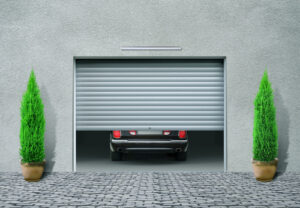Garage door springs do the bulk of the hard work when it comes to closing and opening a garage door. As such, they’re one of the most important parts of any door, and having damaged or broken garage door springs can make the door inoperable or even hazardous.
Unfortunately, most homeowners don’t understand how garage door springs work, how they’re repaired, or why they break. This can easily result in your door malfunctioning at the worst possible time and forcing you to wait for San Diego emergency garage door repair technicians to arrive and fix your garage door springs.
In the following article, we will list the 3 main causes of garage door spring breakage, and explain how to deal with them. Keep reading to learn more.
What happens when a garage door spring breaks?

Is your garage door refusing to go up when you try to open it? Did you hear a loud bang, similar to a gunshot? If this is the case, you likely have broken springs and should have the door examined by registered garage door technicians.
Furthermore, you should refrain from using a garage door opener to raise the door. Doing so not only runs the risk of damaging the opener, but can also be potentially dangerous.
The 3 most common reasons why garage door springs break are:
Improper or irregular maintenance
There’s no such thing as a “lifetime guarantee” when it comes to garage door springs, as every spring will eventually fail. That being said, proper maintenance can greatly prolong the springs’ lifespan and even alert you when they’re about to fail.
Take the time to lubricate the spring using white lithium grease a few times a year. Also, have a registered garage door mechanic check the balance on a seasonal basis. This is especially important during winter, as that’s when most springs break.
Wear and tear
Most springs in America are rated for 10,000 openings and closings. While this might sound like a lot, keep in mind that most Americans open and close their garage door at least twice a day. Once you factor in the other members of your household, the number of daily garage door cycles adds up quickly.
If your garage door sees a lot of use, you should consider installing extended lifespan torsion springs, as these can last for 20,000 or more openings and closings.
Rust
If your springs start to rust, their lifespan will likely be shortened considerably. Corroded springs apply additional friction to the coils and damage them over time, which increases the possibility of failure. The good news is, you can prevent this problem by applying silicon-based lubricant on the springs 3-4 times a year.
Can I replace garage door spring myself?
The only time you should attempt to fix a garage door spring on your own is if you have a background in garage door repair. Otherwise, you almost certainly lack the equipment and training necessary to replace a garage door spring.
Never forget that a garage door weighs 150-250 pounds. Tinkering with it can easily result in all that weight falling on someone or something. For this reason, you should always leave garage door repair to the experts.
Who do I call if I need reliable San Diego emergency garage door repair?
Avoiding garage door scams and ensuring your door is installed and repaired by trusted professionals can be surprisingly difficult. That’s why you should always choose a San Diego garage door company that boasts a long tradition and a superb track record.
Here at Dlouhy Doors, we have all that and more. Whether you’re looking to replace a garage door spring that’s at the end of its lifespan, or you need someone to come to your home in Linda Vista ASAP and fix a garage door that won’t open, you can’t go wrong by giving us a call.